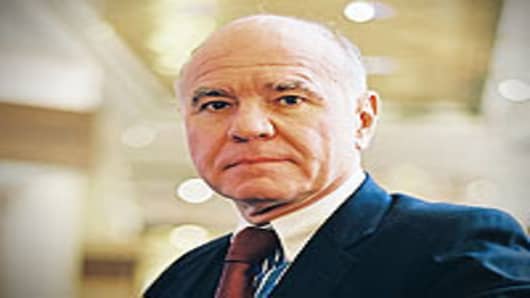Oil prices could make further gains but US stocks could be set for a difficult year, Marc Faber, the author the closely-watched Gloom, Boom and Doom report, said in an interview.
"On the upside, if you look at some other commodities like copper, then obviously oil prices could go up substantially even from these levels," Faber told CNBC's Indian partner TV-18 in Mumbai. "I don't think that oil is expensive compared to other commodities or compared to other goods prices in the world."
"Further gains would obviously depend on some political problems — some interruptions in oil supplies or a possibility of the global economy experiencing some kind of a crack-up boom," he said.
According to Faber, a crack-up boom is a boom that is driven by artificially low interest rates, easy monetary policies and debt growth.
"Crack-up booms don't last. They are not sustainable but they can last between six and 18 months and then a renewed setback occurs in the global economy," Faber said.
After watching the US market double from 2009 lows, he is worried the gains could soon come to an end following the recent sell-off in emerging markets.
"I don't think that emerging markets have bottomed out. In many cases, they are down 20 percent and many stocks, good companies, are down 30 percent from the recent high," Faber said.
"The US stock market has now doubled from its low. In other words, there are only three occasions in the last hundred years when the stock market in the US doubled within two years," he added.
One such occasion was in 1934, coming off a "very deeply oversold condition" in 1932 and the other one was in 1937. After 1937 and 1934, the 12 months return were both negative, Faber said.
"I would be a little bit careful here to just buy the US because investor sentiment is very positive. The volume has been relatively sluggish and the market is extremely overbought by any statistical model," he added.
"My view is that the US market will eventually join the emerging markets on the downside because if you take a bearish view about emerging economies, you cannot be too optimistic about the US because for many US corporations, 50 percent or more of their profits come from emerging economies," Faber said.
"My main concerns are China and political tensions. I think that not all is well in China. If the Chinese economy slows down more then what analysts expect, we could have a downdraft in commodity prices and all the warrants on China — whether it is Brazil, Australia or Indonesia — would get hit quite hard," he explained.



